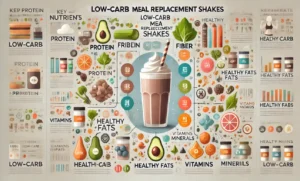Connection Between Gut and Brain: Gut-Brain Axis Supplements

Ever experienced a “gut instinct” about something? Your gut and brain are more intertwined than you may realize. This connection, known as the gut-brain axis, is crucial in our physical and mental health. This article will explore the fascinating connection between gut and brain and how maintaining a healthy gut can improve overall well-being. We will also learn the most effective gut-brain axis supplements supported by scientific research.
Understanding the Gut-Brain Axis
The gut-brain axis is the complex communication network linking your gastrointestinal tract and central nervous system. This bidirectional communication system involves neural pathways, hormonal signals, and immune responses, allowing the gut and brain to continuously send signals to each other.
Role of the Vagus Nerve
The vagus nerve plays a crucial role in connecting the gut and brain. It acts as the main line of communication between the gut and brain, conveying sensory information from the gut to the brain and motor signals from the brain to the gut. Vagal reflexes help regulate gut functions in response to changing conditions, such as the presence of food or chemical changes in the gut.
Gut Microbiome and Brain Health
Your gut hosts trillions of bacteria, commonly referred to as the gut microbiome. These microbes produce many neurotransmitters, such as serotonin, which affect mood regulation and cognitive functions. The gut microbiome can influence brain health by producing chemicals that affect brain function and behavior.
Impact on Mental Health
A powerful connection exists between gut health and mental well-being. Conditions like depression and anxiety are often found in individuals with gut disorders like irritable bowel syndrome (IBS). This connection suggests that maintaining a healthy gut can help alleviate symptoms of mental health disorders.
Physical Manifestations
Emotional stress can lead to physical symptoms in the gut, such as nausea, diarrhea, or constipation. These symptoms directly result from the gut-brain connection, where emotional distress impacts digestive function.
Nutrition and the Gut-Brain Axis
Diet plays a significant role in maintaining a healthy gut-brain axis. A balanced diet of fiber, prebiotics, and probiotics can support a healthy gut microbiome. Foods like yogurt, sauerkraut, and kefir are excellent sources of probiotics that can benefit your gut and brain health.
Stress and the Gut-Brain Connection
Stress triggers a cascade of responses in the body that can affect gut health. Chronic stress can alter gut microbiota, leading to digestive issues and exacerbating mental health problems. Managing stress through relaxation techniques, mindfulness, and regular exercise is crucial for maintaining gut-brain health.
Therapeutic Approaches
Therapies like Cognitive Behavioral Therapy (CBT) and mind-body therapies, such as meditation and hypnotherapy, have improved communication between the gut and brain. These therapies can help manage symptoms of gut disorders and improve overall mental health.
Probiotics and Mood Improvement
Research indicates that probiotics can positively impact mood and mental health. They help maintain a healthy balance of gut bacteria, which can influence the production of mood-regulating neurotransmitters like serotonin.
Inflammation and Gut Health
Inflammation in the gut can disrupt the gut-brain axis, leading to digestive and mental health issues. Diets rich in omega-3 fatty acids, antioxidants, and fiber can help lower inflammation and promote a healthy gut.
Exercise and Gut-Brain Health
Regular physical activity is beneficial for both gut and brain health. Exercise can enhance gut motility, improve the balance of gut bacteria, and reduce stress levels. Strive for at least 30 minutes of moderate physical activity on most days of the week.
Sleep and the Gut-Brain Connection
Good sleep is essential for maintaining gut health. Inadequate sleep can upset the balance of gut bacteria, intensifying stress and anxiety. Maintaining a consistent sleep schedule and fostering a calm sleep environment can enhance sleep quality and benefit gut-brain health.
Future Research Directions
Ongoing research continues to uncover new aspects of the gut-brain connection. Future studies may lead to innovative treatments for mental health and gut disorders, highlighting the importance of a holistic approach to health that includes gut-brain care.
Supplements for the Gut-Brain Axis: Boosting Both Mental and Digestive Wellness
The connection between our gut and brain, known as the gut-brain axis, plays a crucial role in maintaining mental and physical health. This complex communication network involves the gut’s enteric nervous system and the brain’s central nervous system. Supplements designed to support the gut-brain axis have gained popularity as more people recognize the importance of gut health in overall well-being.
Probiotics: The Good Bacteria
Probiotics are living microorganisms that offer health benefits when taken in sufficient quantities. They are often called “good bacteria” and are primarily known for supporting digestive health. Probiotics can help maintain a healthy balance of gut microbiota, which is essential for proper gut function and overall health.
Research has shown that probiotics can also positively impact mental health. Certain strains of probiotics, such as Lactobacillus rhamnosus and Bifidobacterium longum, have been found to reduce symptoms of anxiety and depression. Probiotics impact the production of neurotransmitters such as serotonin and gamma-aminobutyric acid (GABA), both of which are essential for regulating mood.
Prebiotics: Feeding the Gut Microbiome
Prebiotics are indigestible fibers that nourish the beneficial bacteria in your gut.They help promote the growth and activity of probiotics and other beneficial microbes in the gut. Some well-known prebiotics are inulin, fructooligosaccharides (FOS), and galactooligosaccharides (GOS).
Studies have indicated that prebiotics can improve gut health and, consequently, mental health. By enhancing the growth of beneficial bacteria, prebiotics can influence the production of short-chain fatty acids (SCFAs) like butyrate, which have anti-inflammatory properties and can positively affect brain function.
Omega-3 Fatty Acids: Essential Fats for Brain Health
Omega-3 fatty acids are essential fats in fish oil, flaxseeds, and walnuts. They are known for their anti-inflammatory properties and role in supporting brain health. Omega-3s, particularly eicosapentaenoic acid (EPA) and docosahexaenoic acid (DHA) are crucial for maintaining the integrity of cell membranes and promoting healthy brain function.
Research suggests that omega-3 supplements can benefit the gut-brain axis by reducing inflammation and supporting the production of neurotransmitters. They have been shown to alleviate symptoms of depression and anxiety and may improve cognitive function.
L-Glutamine: Fuel for the Gut
L-glutamine is an amino acid that is a primary fuel source for enterocytes, the cells lining the gut. It supports the gut lining’s integrity, which is crucial for preventing leaky gut syndrome. In this condition, the gut lining becomes permeable, allowing toxins and bacteria to enter the bloodstream and potentially affecting brain health.
Supplementing with L-glutamine can support gut health by promoting healing and reducing inflammation. This, in turn, can positively impact mental health, as a healthy gut lining is crucial for maintaining effective communication between the gut and brain.
Curcumin: The Anti-Inflammatory Powerhouse
Curcumin, a key compound in turmeric, is renowned for its powerful anti-inflammatory and antioxidant effects. It has been extensively studied for its ability to reduce inflammation in the gut and brain, making it a valuable supplement for supporting the gut-brain axis.
Curcumin has the ability to cross the blood-brain barrier and has been found to enhance levels of brain-derived neurotrophic factor (BDNF). This protein supports the growth and survival of neurons. Additionally, curcumin can help reduce symptoms of depression and anxiety by modulating the production of neurotransmitters and reducing oxidative stress.
B Vitamins: Vital for Brain and Gut Health
B vitamins, particularly B6, B9 (folate), and B12, are essential for numerous bodily functions, including brain health and the production of neurotransmitters. Deficiencies in these vitamins have been linked to mental health disorders such as depression and anxiety.
B vitamins support the gut-brain axis by ensuring the nervous system’s efficient functioning and energy production. They contribute to preserving the health of the gut lining and supporting a balanced gut microbiome.
Magnesium: The Relaxation Mineral
Magnesium is an essential mineral involved in over 300 enzymatic processes, including muscle relaxation, nerve function, and neurotransmitter production. It is often called the “relaxation mineral” due to its calming effects on the nervous system.
Magnesium supplementation can benefit the gut-brain axis by reducing stress and anxiety, which negatively impact gut health negatively impact gut health. It also supports the production of GABA, a neurotransmitter that promotes relaxation and reduces nervous system excitability.
Conclusion
Understanding the connection between the gut and brain is crucial for improving physical and mental health. The gut-brain axis is a critical communication network that influences mental and physical health. A balanced diet, stress management, regular physical activity, and quality sleep all contribute to a healthy gut-brain axis and improve overall wellness.
Supplements that support gut health can profoundly affect brain function and overall well-being. Probiotics, prebiotics, omega-3 fatty acids, L-glutamine, curcumin, B vitamins, and magnesium are all valuable supplements for enhancing the gut-brain axis. Adding these supplements to your routine can promote a healthy gut and mind, enhancing mood, cognitive function, and digestive wellness.
FAQs on the Connection Between Gut and Brain
What is the gut-brain axis?
The gut-brain axis is the communication network that links the gut and brain and involves neural, hormonal, and immune pathways.
How does the gut affect mental health?
The gut produces neurotransmitters like serotonin that can influence mood and cognitive functions, impacting conditions like depression and anxiety.
How does the vagus nerve influence the connection between the gut and brain?
The vagus nerve is a crucial communication link that conveys sensory information from the gut to the brain and motor signals from the brain to the gut.
Can diet influence the gut-brain connection?
Yes, a balanced diet rich in fiber, prebiotics, and probiotics supports a healthy gut microbiome, which benefits brain health.
How does stress impact the gut-brain axis?
Chronic stress can alter gut microbiota and digestive function, exacerbating mental health issues and gut disorders.
Are probiotics beneficial for mental health?
Probiotics can help maintain a healthy gut microbiome and have been shown to improve mood and reduce symptoms of anxiety and depression.
What are some common symptoms of a disrupted gut-brain axis?
Symptoms include digestive issues like IBS, nausea, constipation, and mental health conditions such as anxiety and depression.
How can exercise benefit the gut-brain connection?
Regular exercise improves gut motility, enhances gut microbiota balance, and reduces stress, supporting overall gut-brain health.
Why is sleep important for gut health?
Poor sleep can disrupt gut bacteria balance and exacerbate stress and anxiety, affecting gut and brain health.
What future research is being done on the gut-brain connection?
Ongoing research aims to uncover new treatments for mental health and gut disorders by further exploring the gut-brain axis.
References
- Johns Hopkins Medicine. The Brain-Gut Connection. HopkinsMedicine.org.
- Cleveland Clinic. What Is the Gut-Brain Connection? ClevelandClinic.org.
- BrainFacts.org. The Gut and Brain: A Surprising Connection. BrainFacts.org.
- Verywell Mind. Groundbreaking Research Sheds Light On The Gut-Brain Connection. VerywellMind.com.






